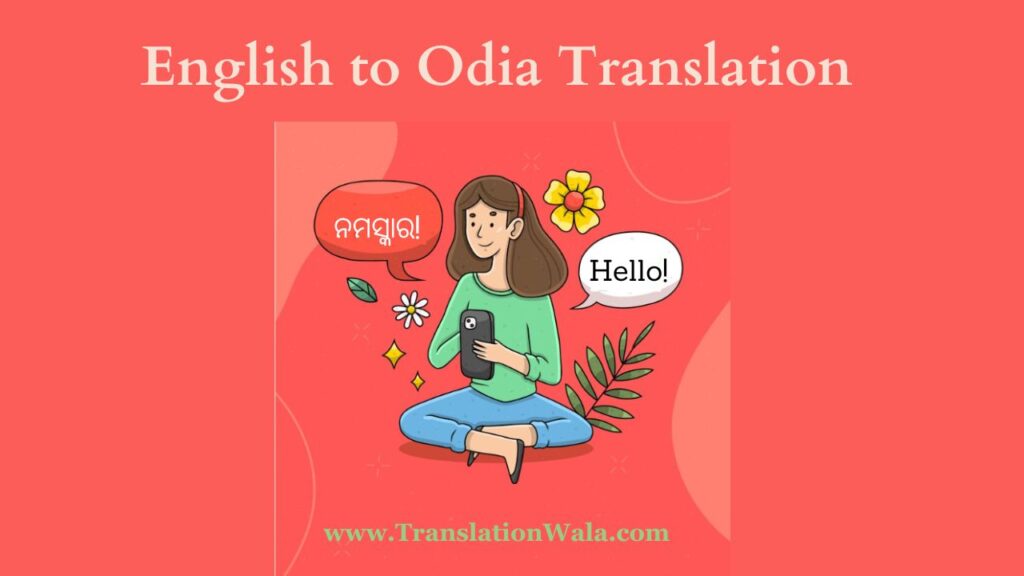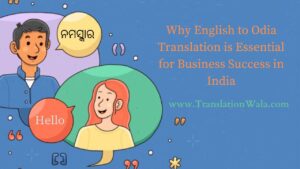English to Odia Translation: The Bay of Bengal is very big and blue. It connects the different parts of India, each with its own rich language and literature history. One side has English, which is spoken all over the world, and the other side has Odia, which is the beautiful language of Odisha and has a long history. And the people who travel across this vast area bringing stories, songs, facts, and ideas are the interpreters. They build bridges between these different language worlds.
Translation is more than just changing words from one tongue to another, though. It’s a skill, an art, and a dance between different races. It’s about getting to the heart of a language, the subtleties that lie below the surface, and putting them back into a language that a new group of people can understand. It’s a very rewarding and difficult trip for the person who English to Odia Translation.
The Odia Advantage: A Language Steeped in Melody and Nuance
Odia has a unique personality and a long writing past that goes back hundreds of years. It’s a poetic language where meaning is just as important as rhythm and rhyme. Every word shows how someone feels and is influenced by their culture. This is both a great trove of words for the translation and a possible danger. To translate an English poem into Odia’s sing-song meter, you need to know a lot about both languages and their cultural details.
The English Enigma: Unraveling the Subtleties of the Global Tongue
English, on the other hand, is more difficult to learn. You can tell a lot about a language by looking at its idioms and slang, which are always changing. The person translating must be good with words and know how to find the right Odia words that not only say what needs to be said but also keep the right tone and spirit.
Also Read: App Localization Unleashed: Strategies for Seamless Global User Experiences

Navigating the Currents: Challenges and Considerations
There are some hard parts on the way from English to Odia. Here are some important things that translators need to know:
- Finding the Right Register: English can be serious or casual, academic or everyday. To fit the tone and aim of the text, the translation has to find the right range in Odia.
- Cultural Equivalents: Not all ideas can be translated directly. To avoid confusion and make sure the information gets through to the right people, the translation has to find regionally appropriate words in Odia.
- Poetic License: Poetry is a special kind of hard. It’s not enough to just translate verse so that it makes sense; you also have to keep the flow, rhyme, and images that make the original language emotional.
- The Nuance of Idioms: A lot of the time, idioms and proverbs can’t be translated word-for-word. The translator has to think of creative ways to show what they mean and how they affect people in Odia.
Beyond the Words: The Translator’s Bridge-Building Role
It’s not just about getting the words right when English to Odia Translation, it’s also about sharing culture. Translators are very important because they bring new ideas and points of view to people who read Odia and share the rich cultural history of Odisha with the rest of the world.
Here are some ways that translators can help with this exchange of cultures:
- Raising Awareness: Translators can talk about how important it is to translate in order to help people learn and appreciate other cultures.
- Mentorship and Collaboration: A strong translation community is created when experienced translators help and work with prospective translators.
- Technological Advancements: Using translation tools and technologies can make the process faster and more accurate, but human knowledge is still needed to understand the subtleties of language.
The Ocean of Possibilities: A Future Rich in Translation
There are many great things that could happen in the future with English to Odia Translation. As globalization grows and more international material is needed, translators will become more important as a way to connect countries and share information. Even as technology improves and translation tools get smarter, human experience will still be needed to make sure that texts are accurate and sensitive to different cultures.
Those who want to learn how to translate from English to Odia should know that it’s not just about words; it’s about building bridges, promoting understanding, and adding to the literature world of both languages. You can start a journey that is both difficult and rewarding if you are dedicated, creative, and have a deep respect for both cultures. You will be able to leave your mark on the fabric of human expression that is always changing.



